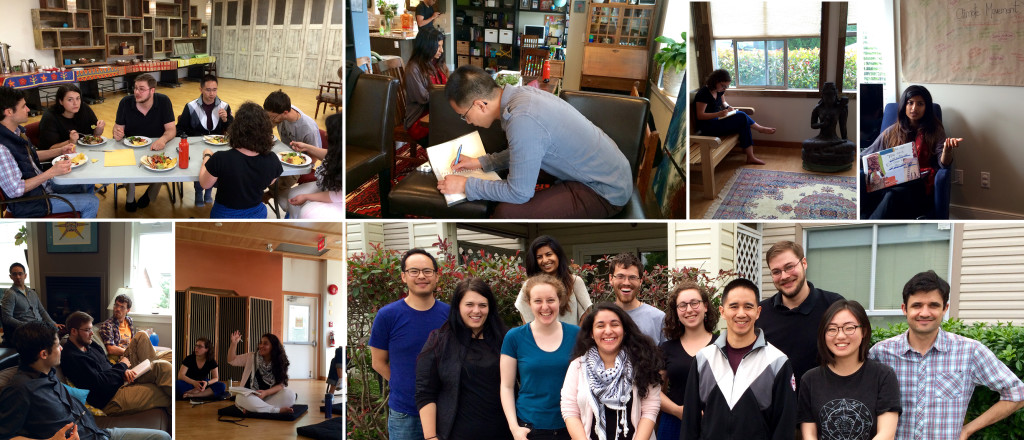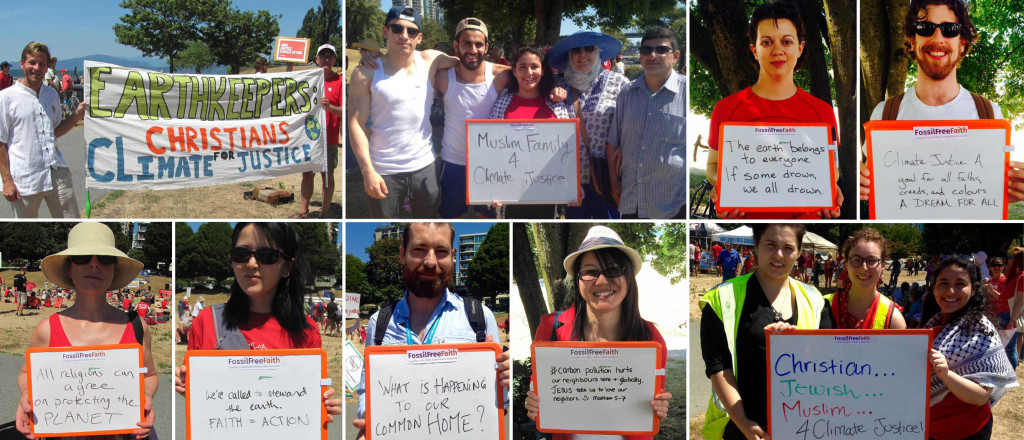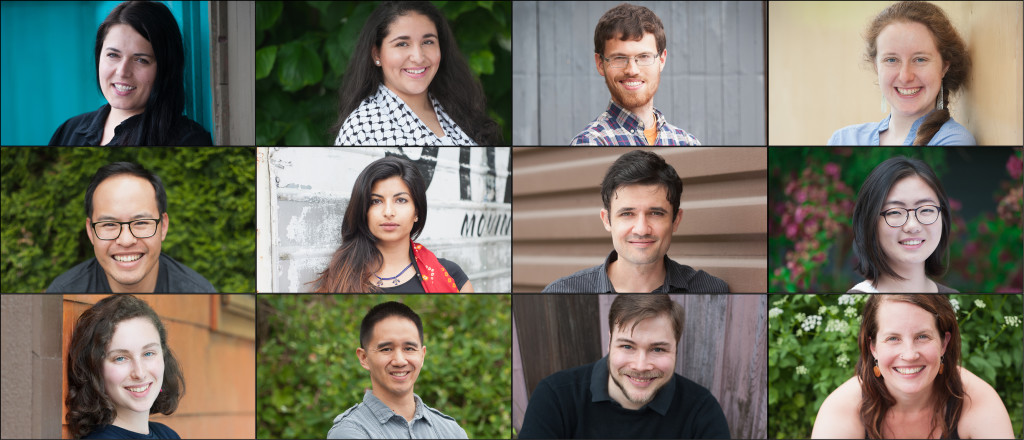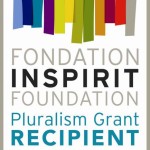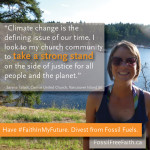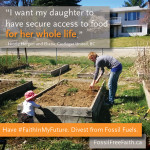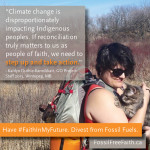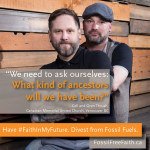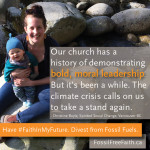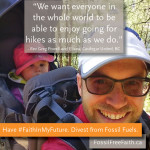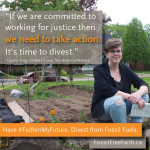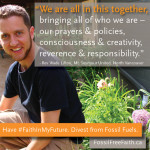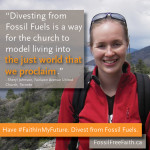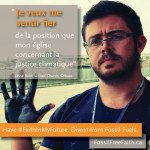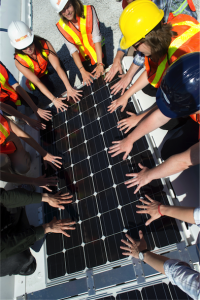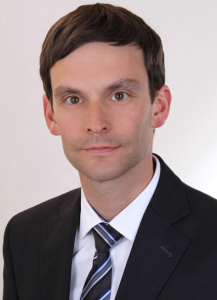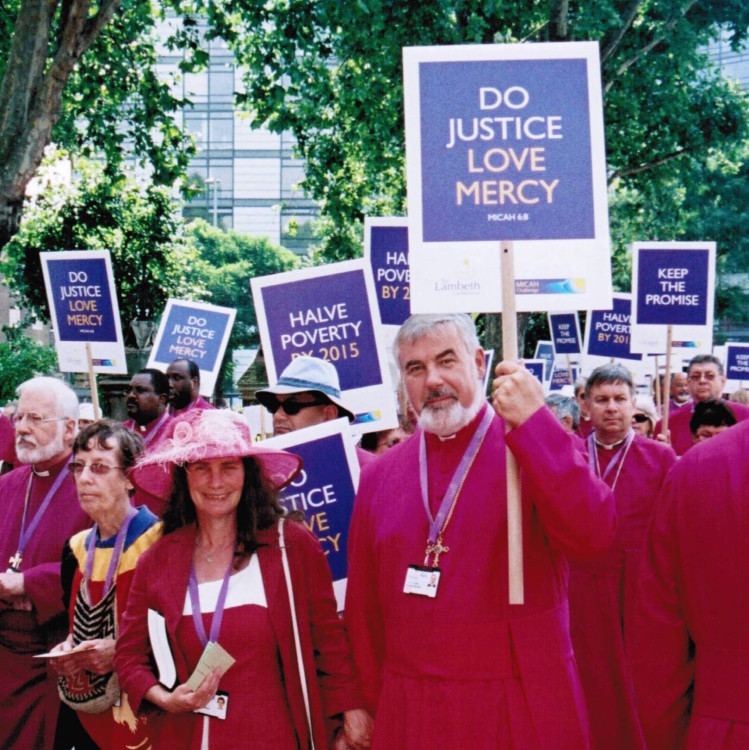
Anglican Diocese of Quebec Divests
DIOCESE OF QUÉBEC: DIVESTMENT REPORT: 23 November 2015
Background:
Some aspects of the Governance of the Diocese of Québec differ from that of most or all other dioceses because of its time and place in pre-Confederation history. Within this Diocese, responsibility for investments rests within the mandate of an entity called Church Society of the Diocese of Québec. Church Society exercises this part of its role through an Investment Committee of professionals who volunteer their time and expertise.
Process:
Following the direction of motions passed at the annual general meeting of Church Society, the Investment Committee began four years ago to divest from its mining holdings, given the serious ethical concerns raised around environmental and human rights issues.
In 2014 a motion passed at the Church Society called on the Investment Committee to review its fossil fuel holdings and present back to Church Society. (This motion was forwarded to the CMWG earlier this year.)
During that year, extensive documentation on the impacts of fossil fuel exploration, extraction, transformation and transportation were forwarded to the chair of the Investment Committee, Central Board (which governs Church Society) and the Diocesan Executive Council. Documents collected came from such diverse sources as the International Monetary Fund, the World Bank, Governor of the Bank of England, World Council of Churches, The Anglican Consultative Communion and the writings of Pope Francis. (This is but a small sampling of the total research made available from international and national environmental, financial and church bodies.)
At Church Society’s annual general meeting of 2015 Diocesan Bishop Dennis Drainville, President of Church Society, issued a letter in follow up to the various motions, review of holdings and research. (This letter was forwarded to the CMWG earlier this year.)
On 23 September 2015, the Investment Committee of the Diocese of Québec was pleased to report that divestment from fossil fuels and mineral extraction was almost complete.
On 23 November 2015, the Investment Committee was able to provide the details of the divestment process.
Details:
Over the past 4 years, $525,000 dollars in gold and copper mining operations have been divested.
Over the past 2 years, $1.4 million dollars in oil and gas have been divested.
$320,000 remain in fossil fuels as that financial instrument has not reached maturity. By year end, the committee expects to be 100% divested.
On 26 November 2015 Bishop Drainville shared this good news within his charge to Synod.
The Diocese will continue work on this critical issue as part of its commitment to the Fifth Mark of Mission.
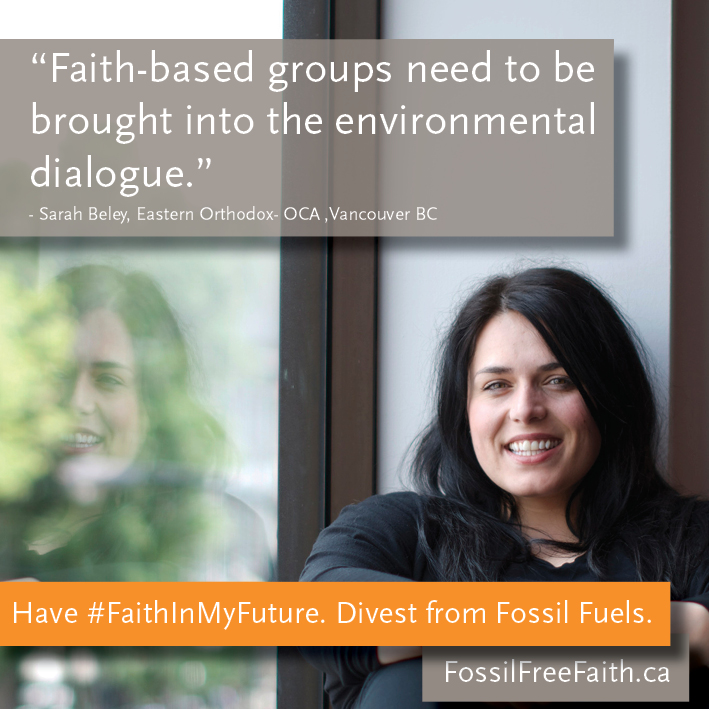
Our youth fellows have big dreams, and tons of skill
In January 2015, Fossil Free Faith launched a call for religious-or-spiritual youth concerned about climate change to be part of a fellowship program aimed amplifying young, faithful voices for climate justice.
We had an incredible group apply. And over the past 10 months, we’ve been making it happen. Here’s some of what the Fossil Free Faith Youth Fellows have been up to:
On May 24-26th, we gathered for an intensive weekend training at Bridge and Enrich in East-Vancouver. We shared stories, and shared food, and did training on climate science, economics, communications, social movements and theories of change.
Following the training, a number of fellows wrote blog posts for our friends at Faith & the Common Good/Greening Sacred Spaces.
Maisaloon Al-Ashkar: From the Heart
Talia Martz-Oberlander: Using the personal narrative to move climate justice forward
Leo Yu: The Pope, the Dutch and other Reflections
Sarah Beley: Bringing faith-based groups into the environmental dialogue
They also began mobilizing to build a stronger faith-based presence at the upcoming Jobs, Justice & Climate rally in Vancouver. They participated in 350 Vancouver planning meetings. And then hosted Calling on Faith Voices – a dialogue to mobilize faith communities around climate issues. On July 4th the fellows organized and hosted a hugely successful ‘Faith Hub’ at the Jobs, Justice & Climate rally. And FFF fellow Maisaloon was one of the rally’s keynote speakers.
The following day, our friends and collaborators hosted a Multifaith Climate Iftar, following the Jobs, Justice & Climate rally in Toronto.
Around the same time, Fossil Free Faith Coordinator Christine Boyle wrote Why the Pope has caught this non-Catholic’s Attention, before heading to Rome to represent Fossil Free Faith Canada at the Our Voices Emerging Leaders Multi-Faith Climate Convergence.
And the project gained some media attention. Including an article in the Vancouver Courier called Keeping the Fossil Free Faith. And a feature article in the Jewish Independant about Talia and her work for Climate Justice. As well as significant media coverage on the United Church of Canada’s national divestment decision, which Fossil Free Faith was involved in.
Our fellows kept doing their own organizing. Sarah hosted a public event called Conversations with Heart: Dialogue for Healthier Communities. Jason, Eduardo and others were part of launching EarthKeepers: Christians for Climate Justice at the 10th Ave Christian Alliance Church in Vancouver. Eduardo published “Dejó Huella el Nazareno”, a book of poetic and theological reflection on the gospel and creation (in Spanish), and traveled home to Costa Rica to launch it. And others have been doing less visible work, talking and listening and bearing witness to the need for faithful climate justice.
And they kept writing and speaking. Leo wrote two op-eds about faith and action: What our leaders aren’t telling you: Jesus was a radical social activist and Finding the courage to take action. Talia wrote This Year I’m Praying for a New Government for Ricochet Media. And Christine spoke as part of the Earth and Spirit Speaker Series at St. Anselm’s Anglican Church.
And we have officially launched the Faithful Voices Speakers Bureau. Because conversations about both faith and climate in Canada need some fresh voices. Interested in having one of them join a panel at an event or conference you are organizing? Or guest-preach in your congregation? Or contribute to your newsletter, magazine or blog? Contact us to make a request.
The pilot project of this youth network was supported by the Inspirit Foundation, and powered by Faith & the Common Good and Spirited Social Change. For more information email: christine (at) spiritedsocialchange (dot) org.
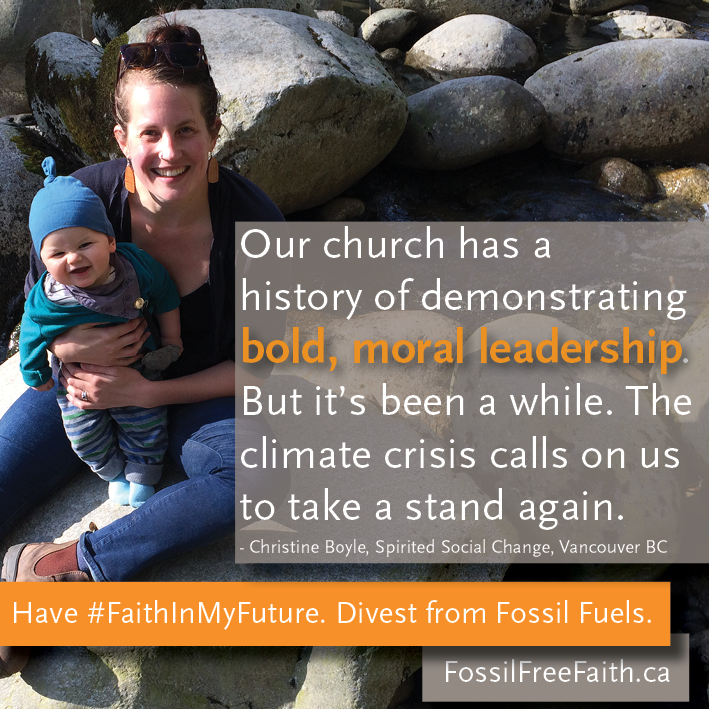
United Church of Canada Votes to Divest from Fossil Fuels
On August 11th, 2105 the United Church of Canada voted to sell its fossil fuel assets and commit financially to transitioning to an economy based on renewable energy. The vote was held by the 42nd General Council, the United Church’s highest body, which meets triennially to determine the denomination’s priorities. Climate justice, whereby the world’s most vulnerable populations avoid disproportionate harms of climate chaos, stands as a clear priority for Canada’s largest protestant denomination.
“The United Church of Canada has voiced its concern about human-induced climate catastrophe for decades. Given the lack of political and industrial leadership to address climate concerns in a way that matches the scale of the problem, we wanted to signal that we are so serious about averting climate crisis that we are willing to put our money where our mouth is,” said Christine Boyle, the General Council commissioner, parent, and long-time climate advocate. “Many in the United Church see Jesus as a friend of the poor and an advocate for the marginalized. Today we have committed to journeying in his footsteps, raising our moral voices to address the burdens of climate chaos that disproportionately affects those living on the margins.”
The denomination has addressed the climate crisis several times at previous General Councils. This is the first time it has committed to moving its investments away from fossil fuels the same way it moved away from tobacco and gambling companies years ago.
“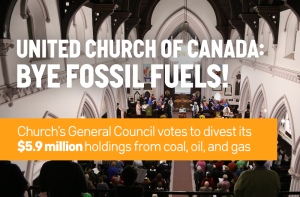 The United Church of Canada has lived into the policies that it has developed over the past 20 on climate justice, and is taking prophetic leadership,” said Jeanne Moffat, a leader with Trinity-St. Paul’s United Church’s climate justice group. “We should see this as a symbol of hope for the climate justice movement.” Folks from across Canada have worked on this for years, finding inspiration from a similar initiative to end apartheid in South Africa and from what the World Council of Churches and other faith communities across the globe are doing to transition to a sustainable future.”
The United Church of Canada has lived into the policies that it has developed over the past 20 on climate justice, and is taking prophetic leadership,” said Jeanne Moffat, a leader with Trinity-St. Paul’s United Church’s climate justice group. “We should see this as a symbol of hope for the climate justice movement.” Folks from across Canada have worked on this for years, finding inspiration from a similar initiative to end apartheid in South Africa and from what the World Council of Churches and other faith communities across the globe are doing to transition to a sustainable future.”
The motion for the General Council to divest follows motions at Conferences across the country. At its conference in May, oil-rich Alberta voted to articulate a vision of Canada without fossil fuels. Both Toronto Conference and Manitou Conference also sent divestment proposals to General Council.
During the debate on the issue, commissioners voiced concern for people in Alberta, Saskatchewan and elsewhere who will need support to transition away from economies that are presently so dependent on fossil fuels.
The General Council Executive will now chart the path for the Treasury to sell its holdings of the world’s 200 largest fossil fuel companies, and to take active steps to re-invest those assets in green renewable energy co-operatives. Currently these holdings constitute $5.9 million, or 4.7% of the United Church of Canada Treasury.
Media Coverage to date:
United Church to drop fossil fuels from investments due to climate concerns
570 News – Aug 11, 2015
- Sarena Talbot, United Church
- Nicole Hergert, United Church
- Kaitlyn Duthie-Kannikkatt, Catholic
- Coll Thrush, United Church
- Christine Boyle, United Church
- Lauren King, United Church
- Rev Wade Lifton, United Church
- Jesse Root, United Church
Nov 19 Toronto Event: Powering the Future
Powering the Future: Insights from Co-Operative Energy Transition
FREE Presentation with Dr. Andreas Wieg, Head of the German Office for Energy Cooperatives
Join the Federation of Community Power Co-operatives and GTA-based energy co-operatives to learn more about local and international activities in community power and the growing trend of green energy impact investing. The event is free but space is limited.
November 19, 7pm – 9pm
YWCA 87 Elm St (Dundas & University)
Sept 30 Calgary Event: Phasing Out Coal: A Healthy Decision
“The majority of Alberta’s electricity is generated by coal fired plants (Alberta Energy, 2012). The research is now clear that burning coal comes with substantial human health costs. In Alberta alone coal contributes to over 100 fatalities and more than 4,000 asthma symptom days every year (Alberta study here). What are the impacts of coal on human health? How can Alberta include health issues related to burning coal in its energy strategy?”
Join this University of Calgary conference, featuring keynote speaker Dr Alan Lockwood, M.D. FAAN, Emeritus Professor of Neurology at the University at Buffalo.

Alan H. Lockwood, M.D. is an Emeritus Professor of Neurology at the University at Buffalo. He is a graduate of Cornell University and Cornell University Medical College (now known as the Weill Cornell Medical College) and was trained in Neurology at the University of California, San Francisco. He is board certified in Neurology and is a Fellow of both the American Neurological Association and the American Academy of Neurology. He is the author of approximately 220 publications on diverse scientific topics ranging from hepatic encephalopathy and medical problems of musicians to functional imaging of the auditory system, tinnitus and environmental toxicants. He has been a member of Physicians for Social Responsibility (PSR) for three decades and was President of PSR National in 1994, is currently a member of the Board of Directors and Co-Chair of the Environment and Health Committee. His book, The Silent Epidemic: Coal and the Hidden Threat to Health, was published by the MIT Press in September 2012. A second book on health effects of global warming is forthcoming.
When: September, 30 2014
Where: University of Calgary Main Campus, Room: TBD
Registration: Not open yet, check back here for more information
